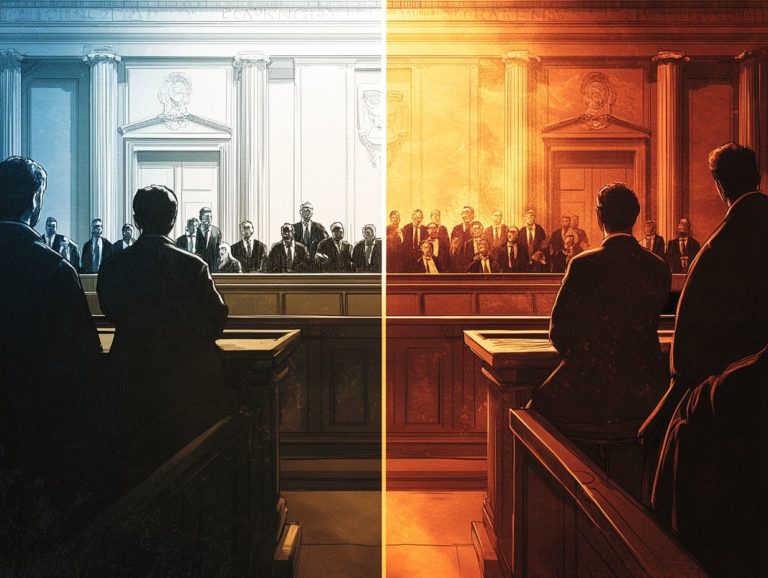The Intersection of Ethics and IP Litigation
In the intricate realm of intellectual property litigation, ethical considerations are paramount. They influence outcomes while preserving the integrity of the legal profession.
This article delves into the many aspects of ethics in IP litigation, tackling essential issues such as conflicts of interest, client confidentiality, and attorney-client privilege. This means that conversations between a lawyer and their client are confidential.
Through engaging case studies and best practices, you will navigate the ethical dilemmas that attorneys frequently encounter. You will also examine the profound impact these ethical standards have on litigation results.
By grasping these dynamics, you can enhance your commitment to ethical practices. You will contribute to a culture of integrity within the intellectual property landscape.
Contents
- Key Takeaways:
- Ethics in Intellectual Property (IP) Litigation
- Key Ethical Considerations in IP Litigation
- Navigating Ethical Dilemmas in IP Litigation
- The Impact of Ethics on IP Litigation Outcomes
- Ensuring Ethical Practices in IP Litigation
- Frequently Asked Questions
- What is the intersection of ethics and IP litigation?
- Why is it important to consider ethics in IP litigation?
- What are some common ethical issues that arise in IP litigation?
- How can conflicts of interest be managed in IP litigation?
- What is the role of attorney-client privilege in IP litigation?
- How can attorneys ensure they are meeting ethical obligations in intellectual property lawsuits?
Key Takeaways:
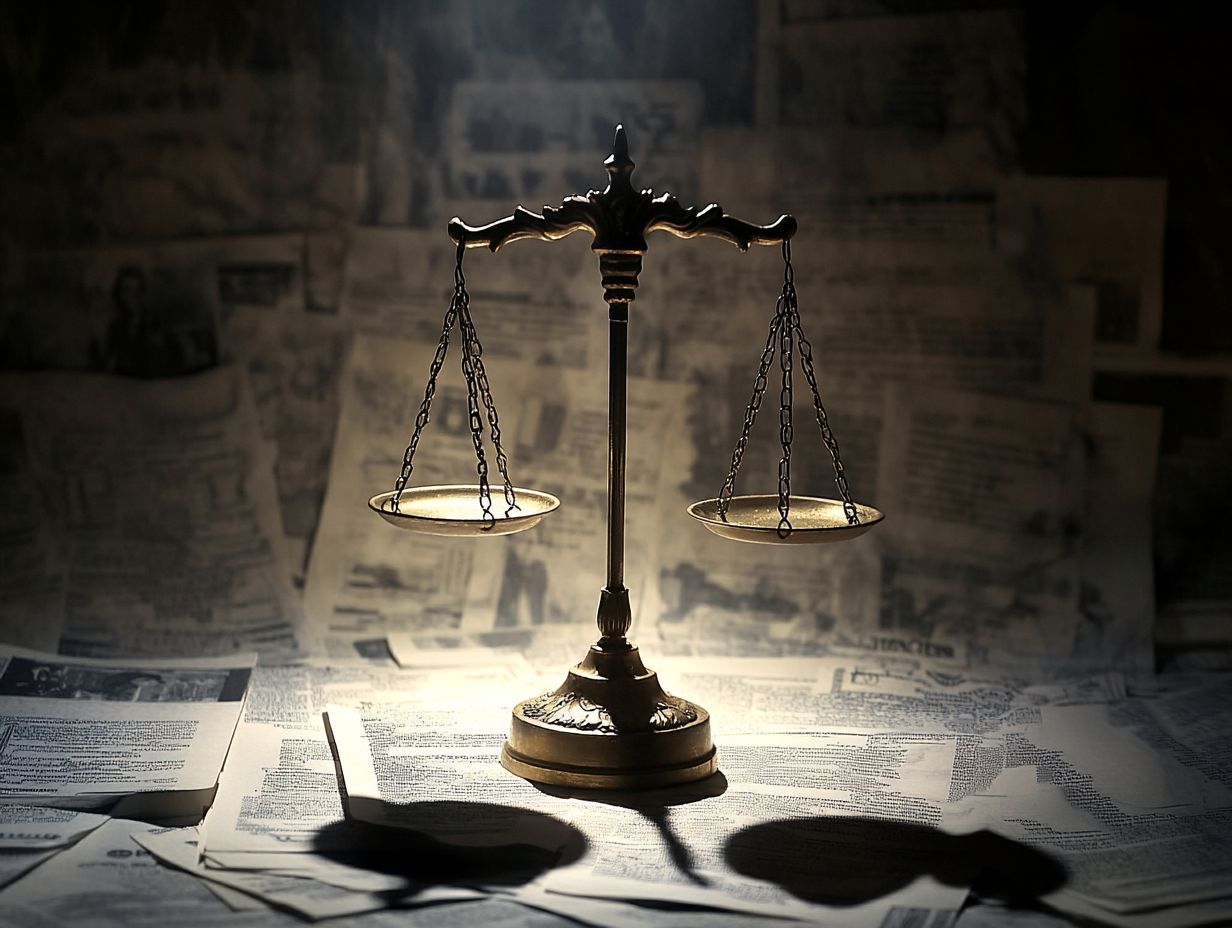
Ethics in Intellectual Property (IP) Litigation
Ethics in Intellectual Property (IP) litigation serves as a crucial framework that guides your conduct. This framework is essential as you navigate the complex legal landscape where technology and intellectual property meet.
As you delve into the intricacies of patent prosecution and trademark litigation, maintaining ethical standards is vital. This safeguards your clients’ interests and ensures fair practices.
In a world increasingly shaped by AI and technology, balance your legal ethics with innovative strategies. This not only protects the integrity of intellectual property, but also spans a wide range of regulated industries, including aerospace, biotechnology, and entertainment.
Defining Ethics in the Context of IP Litigation
Defining ethics in IP litigation requires you to grasp the responsibilities that legal professionals must uphold. This involves a delicate balancing act between serving your client’s interests and fulfilling obligations to the court and the broader legal community.
Ethical frameworks guide your decision-making processes. They ensure you navigate the intricacies of IP disputes with unwavering integrity.
The emergence of new technologies, especially artificial intelligence, introduces unique challenges. These innovations reshape how intellectual property is created, managed, and litigated, requiring your constant ethical reevaluation.
Stay alert to issues surrounding fairness, transparency, and accountability. Regular assessments maintain trust in our legal system, especially in a landscape that is continually evolving.
Key Ethical Considerations in IP Litigation
In the realm of IP litigation, you ll encounter several crucial ethical considerations. These demand your careful navigation throughout the process.
It s essential to ensure compliance with legal standards. Upholding your professional integrity is vital.
Conflicts of Interest
Conflicts of interest pose significant challenges for you as an attorney in IP litigation. These situations demand careful navigation to uphold ethical standards.
They can emerge when you have prior relationships with opposing parties or represent clients with competing interests. This can compromise your ability to advocate effectively.
For instance, if you ve previously assisted a competitor in securing a patent, you may face ethical dilemmas if you later represent a client challenging that same patent’s validity.
If you don t manage such conflicts properly, repercussions could be severe. They may lead to case dismissals or even professional disbarment.
Legal ethics provide a framework to help you identify these conflicts early on. This encourages you to disclose any potential issues and, when necessary, withdraw from representation.
This ensures you remain committed to acting in the best interest of your clients.
Client Confidentiality
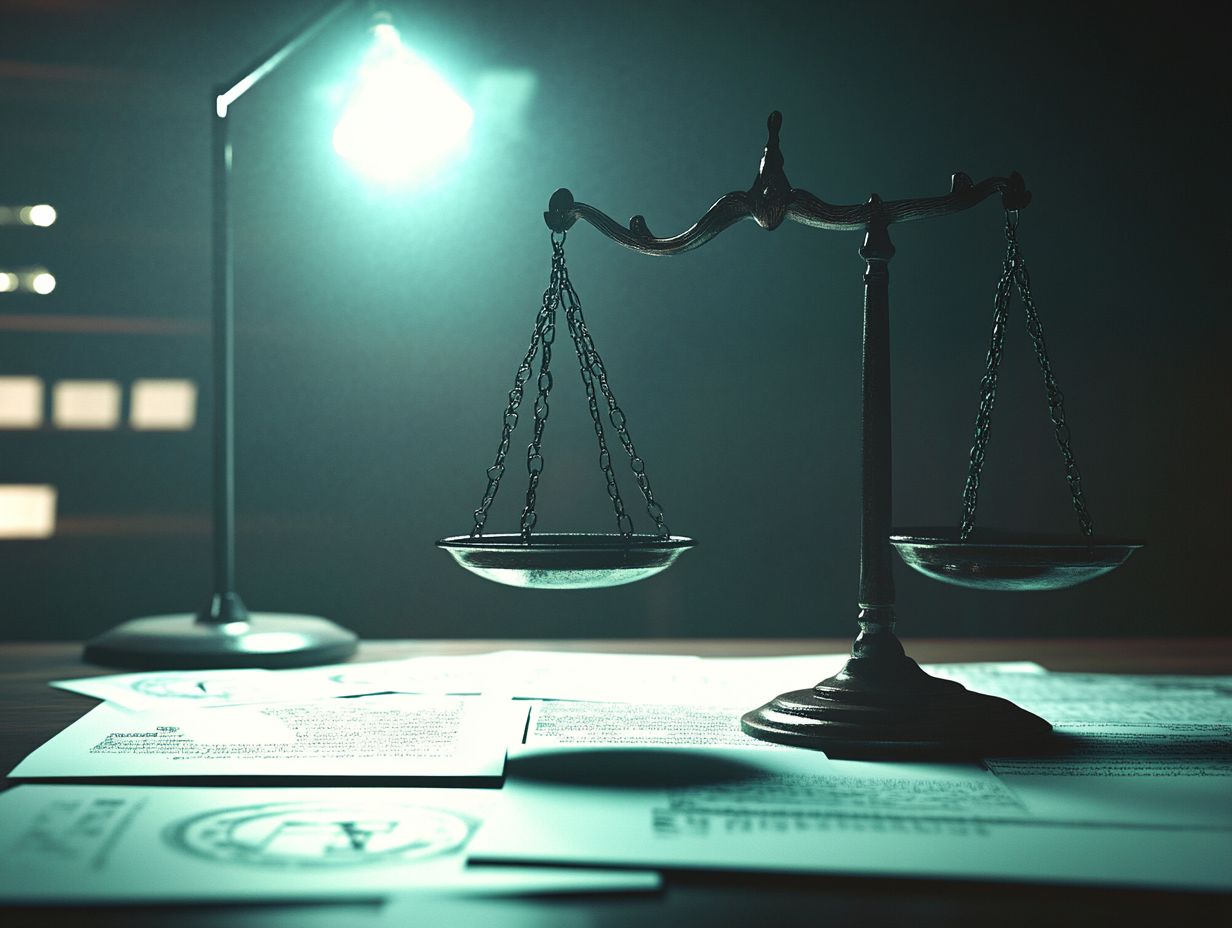
Client confidentiality is a cornerstone of legal ethics in IP litigation. It requires you to protect sensitive information related to intellectual property matters. This responsibility goes beyond mere compliance with regulations; it is the foundation of the trust that clients place in you as their legal representative.
Consider this: if you were to inadvertently disclose a client’s proprietary formula during negotiations, the fallout could be significant. Not only might this jeopardize the client’s competitive advantage, but it could also expose you to legal repercussions and damage your reputation.
Breaches can result in lost client relationships, costly lawsuits, and a tarnished professional image. The ramifications of compromising client confidentiality can extend throughout the industry, influencing not just the individual case but also shaping broader perceptions of legal integrity and trustworthiness.
Attorney-Client Privilege
The attorney-client privilege is a vital legal principle in IP litigation that safeguards the confidentiality of communications between you and your attorney. This confidentiality is foundational, giving you the power to discuss your inventions, strategies, and potential legal challenges without the worry of exposure.
It cultivates an atmosphere of trust, essential for sharing all pertinent information that your attorney needs to provide effective counsel. However, it’s important to note that this privilege isn t absolute; it can be challenged or waived in certain situations, such as when you attempt to use privileged communications in litigation or if fraud is suspected.
The relationship between attorney-client privilege and legal ethics is significant. Your attorney must balance the duty to keep your conversations confidential with the ethical obligation of candor to the court.
Navigating ethical dilemmas in IP litigation requires you to apply best practices while drawing on case studies that highlight the intricate complexities of ethical decision-making.
Each situation offers valuable insights that can guide your judgment and enhance your approach to these challenging scenarios.
Case Studies and Best Practices
Case studies can serve as a guiding light when navigating the ethical dilemmas inherent in IP litigation. They reveal best practices that can significantly benefit your legal approach.
By examining real-world scenarios, you can uncover valuable insights into the intricate landscape where intellectual property rights meet ethical responsibilities. These examples often highlight the nuanced challenges that emerge in cases involving patent infringements, copyright disputes, or misappropriation of trade secrets.
As technology advances, the IP landscape evolves, prompting critical questions about digital rights management, data privacy, and the ethical implications of artificial intelligence. Analyzing specific case outcomes allows you to reflect on your decision-making processes and cultivate strategies that prioritize integrity while effectively advocating for your clients’ interests.
The Impact of Ethics on IP Litigation Outcomes
Ethics play a crucial role in determining the success of IP litigation, shaping not only the results of the case but also the reputation and professional standing of the attorneys involved.
Reputation and Professional Consequences
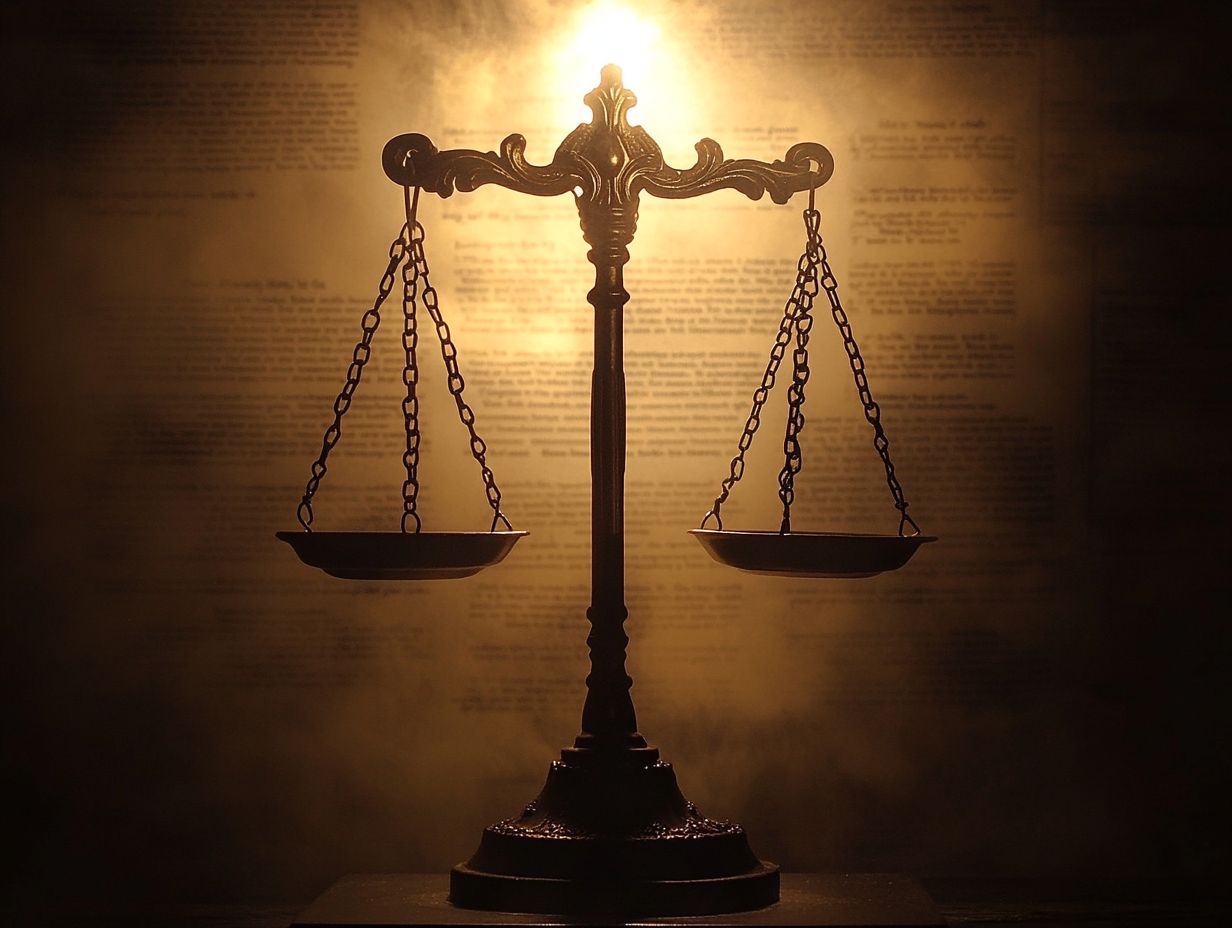
An attorney’s reputation hinges on their commitment to ethical standards in IP litigation. Breaches can lead to significant professional repercussions.
Clients naturally gravitate toward legal representation that embodies skill, trustworthiness, and integrity. When an attorney strays into unethical territory like misrepresenting facts or resorting to dishonest tactics the consequences can be both swift and severe.
You may find that loss of clientele is a common fallout, as individuals and businesses are inclined to distance themselves from any whiff of impropriety. Such behavior can also trigger disciplinary actions from bar associations, jeopardizing an attorney’s ability to practice law and irreparably tarnishing their professional image.
This reality highlights the vital need to uphold a strong ethical foundation. Reputational damage can linger long after a case has concluded.
Ensuring Ethical Practices in IP Litigation
Ensuring ethical practices in IP litigation requires you to leverage the wealth of tools and rules at your disposal.
These tools will aid you in navigating the complex landscape of legal ethics, allowing you to uphold the highest standards in your practice.
Resources for Attorneys
You have access to various resources designed for attorneys committed to ethical practices in IP litigation.
Legal journals are a valuable source of articles and case studies that delve into contemporary ethical challenges, offering invaluable insights into best practices.
Organizations like the Practicing Law Institute (PLI) provide seminars, workshops, and publications centered on ethical considerations across various legal fields.
You can also find many continuing legal education (CLE) opportunities, ensuring you stay compliant with the latest standards while deepening your understanding of the ethical implications of your work.
By engaging with these resources, you can navigate the complexities of legal ethics and make informed decisions that reflect your professional responsibilities.
The Role of the Court in Enforcing Ethical Standards
The court’s enforcement is crucial in upholding ethical standards in IP litigation, ensuring that you, as an attorney, remain aligned with established legal ethics.
This enforcement preserves the integrity of the judicial process and protects the rights of all parties involved.
By monitoring attorney conduct and taking disciplinary actions when necessary, the courts cultivate a culture of accountability. For example, case law highlights how specific rulings address misconduct, demonstrating the judiciary’s proactive approach to maintaining ethical norms.
These decisions often reflect broader standards established by bar associations, fostering a culture of professionalism that ultimately serves both the legal community and clients exceptionally well.
Frequently Asked Questions
What is the intersection of ethics and IP litigation?
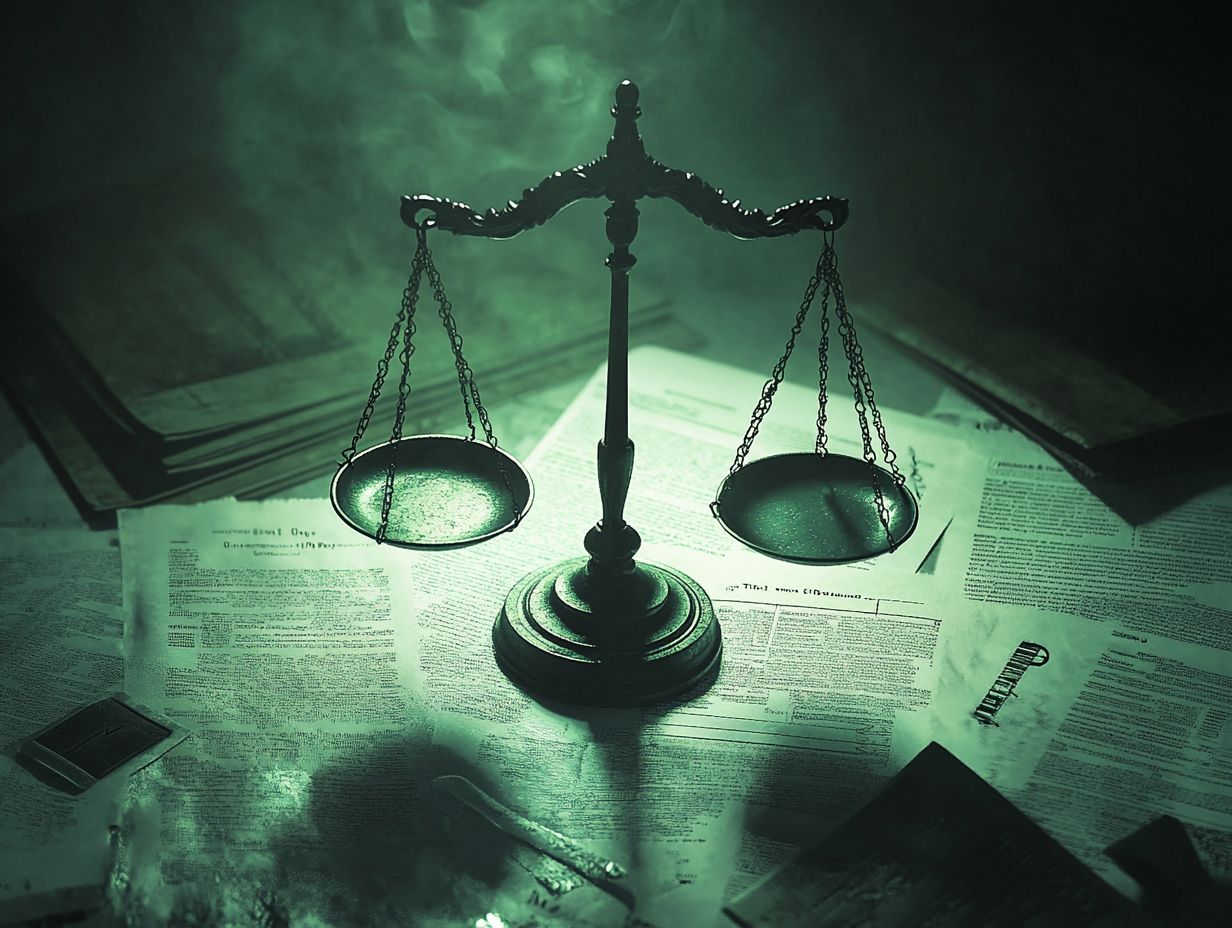
The intersection of ethics and IP litigation refers to the ethical considerations and principles relevant when litigating intellectual property (IP) disputes. This includes issues such as conflicts of interest, attorney-client privilege, and professional responsibility.
Why is it important to consider ethics in IP litigation?
Ethics are essential in any legal practice, and IP litigation is no exception. The outcome of IP disputes can significantly affect both parties involved, making it crucial to conduct the process ethically to maintain the integrity of the legal system.
What are some common ethical issues that arise in IP litigation?
Common ethical issues in IP litigation include conflicts of interest, confidentiality, attorney-client privilege, the duty to disclose relevant information, maintaining the duty of competence, and avoiding deceptive or misleading tactics.
How can conflicts of interest be managed in IP litigation?
Conflicts of interest can be managed by conducting thorough conflict checks before taking on a case, obtaining informed consent from clients in writing, and withdrawing from representing a client if a conflict arises. Establishing a system for monitoring conflicts during litigation is also essential.
What is the role of attorney-client privilege in IP litigation?
Attorney-client privilege protects the confidentiality of communications between an attorney and their client. In IP litigation, this privilege is crucial for safeguarding sensitive information related to trade secrets or other confidential details. However, it’s essential to understand the limits of this privilege and when it can be waived or compromised.
How can attorneys ensure they are meeting ethical obligations in intellectual property lawsuits?
Attorneys can meet their ethical obligations by staying familiar with the rules of professional conduct. They should maintain open communication with their clients.
When facing ethical dilemmas, seek guidance from ethics committees or professional organizations. Regularly review and update your policies to stay compliant and effective!



